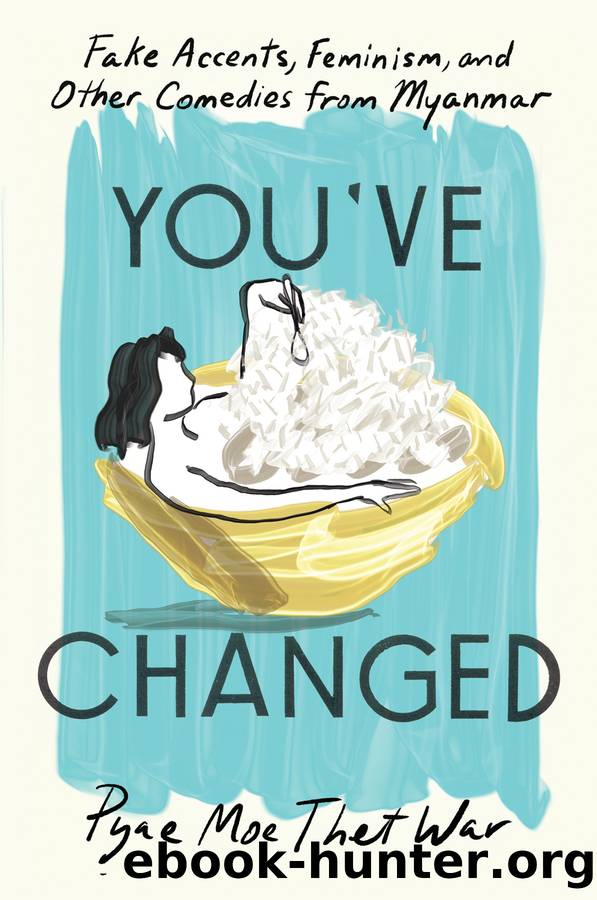You've Changed by Pyae Moe Thet War

Author:Pyae Moe Thet War
Language: eng
Format: epub
Publisher: Catapult
Published: 2022-03-07T00:00:00+00:00
TONGUE TWISTERS
When he was a kid, Phyo couldnât say the letter á in the Myanmar alphabet. It sounds similar to another letter, á, but they are two different letters, like D and T. Native English speakers who take Myanmar language lessons always struggle with á because the sound doesnât exist in the English language; their tongue simply doesnât know how to position itself to make that particular noise. For some reason, Phyo was the only one out of the three of us whose tongue was physically incapable of pronouncing this one letter. At lunch and dinner, we would tease him and tell him to say á, and every time he would say á, and we would laugh and do it again.
âá.â
âá.â
âá.â
âá.â As we laughed, my brother kept going, again and again, mainly to himself now. á. á. á. Nyaaar. No, we would say. When you say á, your tongue starts out at the roof of your mouth. When you say á, your tongue is suspended midair and requires the most minuscule of movements. My brother would think about it as he said it over and over again, until it no longer sounded like an actual letter and simply became a random sound that he was trying to imitate. It frustrated him. All our tongues knew how to make this sound, but his didnât.
Toothpick introduces me to people as Pyae with a hard P, and I never correct him. I donât comment that if you say Pyae with a hard P, then youâre actually saying a different word in Myanmar, youâre saying âslow.â A hard P requires you to start with your lips firmly pressed against each other. In Myanmar, a hard P and a soft P are two separate letters of the alphabet: á and á. Itâs subtle but important, and every Myanmar person knows the difference between the two.
I canât recall if, on the first day of my first undergraduate class (in that then-still-terrifyingly-new-to-me country), when we had to go around and do the customary self-introductions, I introduced myself with two hard Ps or two soft Ps. After all, it was difficult enough to get people to say and remember how to pronounce âPyae,â and insisting that they do it with a soft P as well seemed like an insignificant battle to be picking. Four years later though, on the first day of my MA course in London, I said, âHi, Iâm Pyae Pyae.â Pyae Pyae with two hard Ps. I didnât even stop to think about it. It used to be that I was Pyae with a hard P if a friend from abroad was saying my name, and Pyae with a soft P when I was saying it myself, but somehow, I too began self-censoring and saying âslowâ instead of âfull.â Itâs worked its way into my speech, or at least when Iâm speaking English with non-Myanmar people. My brain makes the switch without thinking twice.
Actress Ania Marson once said that a noticeable physical shift is involved
Download
This site does not store any files on its server. We only index and link to content provided by other sites. Please contact the content providers to delete copyright contents if any and email us, we'll remove relevant links or contents immediately.
Harry Potter and the Goblet Of Fire by J.K. Rowling(3046)
Unfinished: A Memoir by Priyanka Chopra Jonas(2918)
Never by Ken Follett(2884)
The Man Who Died Twice by Richard Osman(2300)
Machine Learning at Scale with H2O by Gregory Keys | David Whiting(2293)
Fairy Tale by Stephen King(2073)
Will by Will Smith(2043)
Rationality by Steven Pinker(1765)
The Storyteller by Dave Grohl(1662)
The Dawn of Everything: A New History of Humanity by David Graeber & David Wengrow(1571)
The Dark Hours by Michael Connelly(1571)
The Stranger in the Lifeboat by Mitch Albom(1532)
Cloud Cuckoo Land by Anthony Doerr(1435)
The Becoming by Nora Roberts(1331)
Friends, Lovers, and the Big Terrible Thing by Matthew Perry(1330)
New Morning Mercies: A Daily Gospel Devotional by Paul David Tripp(1325)
Crying in H Mart by Michelle Zauner(1316)
Einstein: His Life and Universe by Walter Isaacson(1315)
A Short History of War by Jeremy Black(1300)
